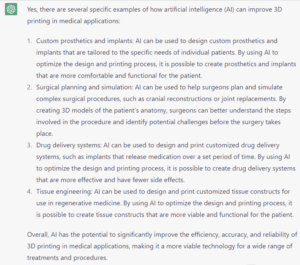Open AI, an artificial intelligence R&D company, recently launched ChatGPT, an AI based on an optimized language model to interact with humans in a conversational manner. As mentioned on Open AI’s website, once a user has created an online profile, it becomes possible to engage in a dialogue with ChatGPT, which is capable of answering follow-up questions, admitting mistakes, challenging incorrect premises and rejecting inappropriate requests.
For example, when ChatGPT is asked “How can AI improve 3D printing?” and then “Do you have more specific examples for 3D printing in medical applications?” the AI is able to instantly give the answers visible in the image. The AI gathers information to provide relevant insight into possible medical application areas where AI could help humans optimize the current 3D printing process. This dialogue system represents an excellent opportunity to realize the full potential of AI by saving time collecting information and compiling it into written text, although reference checking remains essential.

Open AI’s goal is “to make AI systems more natural and safer to interact with” by using ChatGPT to receive user feedback. Since ChatGPT is capable of answering questions and writing a text on a topic resulting from the collection of information available online, it can be used by students, teachers or scientists for writing purposes. The increasing accessibility and performance of AI will challenge areas that include writing, such as education (homework) or science (publication introductions). Managing the integration of AI into our work processes and setting its limits will likely lead to interesting discussions about the balance between benefits and drawbacks.
Learn more about OpenAI and use ChatGPT here.

This article was written by Marie Moulin as part of an ongoing series of scientific communications written and curated by BioTrib’s Early Stage Researchers.
Marie is researching the Bioprinting of Bone and Cartilage at Uppsala University, Sweden.

